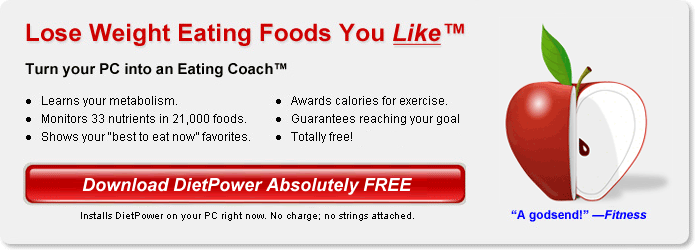

Weight-Loss Software > Calorie Counter
Finding the Best Calorie Counter
By Terry Dunkle, DietPower Editor-In-Chief*
Using a calorie counter is one of the smartest things you can do to lose weight. The reason is simple: the amount of food you eat affects your weight more than what you eat. This is not only common sense, but scientific consensus.
Calorie Counter Extraordinaire!
Download it free. (No strings.)Scientists also agree that the best tool for measuring your food intake is a calorie counter. That's because a food's calorie content is directly related to its fat-producing ability.
What's Behind Every Good Calorie Counter
No matter what calorie counter you choose, it should rest on this formula: one pound of body weight = 3500 calories. (You don't have to remember the formula, though. Read on.)
This means that if you eat 3500 calories less than your body needs, it will burn a pound of fat to make up the difference, and you'll be a pound slimmer.
The only question is how quickly you want to achieve that 3500-calorie deficit. If you shave 500 calories a day off your current eating, you'll lose a pound a week. Double that and you'll lose two pounds a week.
Two pounds a week is the upper limit for permanent weight loss, according to most authorities. Lose weight faster and it will probably come back.
An Easier Calorie Counter
You can act as your own calorie counter by reading food labels and doing the math on paper, following the 3500-calories-per-pound rule above. It's much faster and easier, however, let your computer do the work for you.
There are two ways to convert your computer into a calorie counter. One is to join a website that lets you count calories online. Much better, however, is to install calorie counter software on your own computer. This offers more privacy and doesn't force you to look at ads. It usually gets you better performance, too, because you don't have to wait for data to travel up to a website and down to your computer every time you log a food.
Most diet software can be purchased by downloading from a website. After installing it on your hard drive, you don't have to visit the website anymore—except when you need help or want to check for updates.
Look for More than a Calorie Counter
When you cut calories to lose weight, you may a) feel hungry or b) become deficient in important nutrients.
One solution is to eat lots of fruits and vegetables. These are not only rich in vitamins and minerals, but contain a lot of water. (Despite their rigidity, most plant foods are 90-percent liquid.) Studies show that water-rich foods (potatoes and beans, for example) can make you feel full without ringing alarms on your calorie counter.
To monitor your nutrient intake, choose a calorie counter that also tracks fats, protein, and carbohydrates, as well as vitamins and minerals. (Good examples: sodium and potassium for blood-pressure control, calcium to prevent osteoporosis, folate to forestall birth defects.)
Most programs that monitor your nutrients also award you extra calories for exercise.
One calorie counter, DietPowerŽ, not only tracks 33 nutrients and exercise, but also monitors your metabolism to guarantee reaching your goal weight on your target date. It also has a scoreboard that rates your overall nutrition, as well as a Real-Time Eating Coach™ that shows which of your favorite foods will improve your nutrient balance. You can download a free, no-strings, 15-day trial from www.dietpower.com. In addition, DietPower is the only calorie counter that carries a one-year, 100-percent money-back guarantee.
*Terry Dunkle is a 30-year veteran medical journalist and consumer advocate who serves as CEO and chief editor at DietPower, Inc., a leading maker of nutrition and weight-loss software.
To comment on this page, click here.
|
 Click here to see biographies Click here to see biographies of DietPower's scientific advisory board members. |
SPAM POLICY: DietPower doesn't send emails to people who haven't requested them, nor do we share email adresses with third parties. If you
suspect that someone has subscribed you to our mailing list fraudulently, email us at webmaster@dietpower.com.

